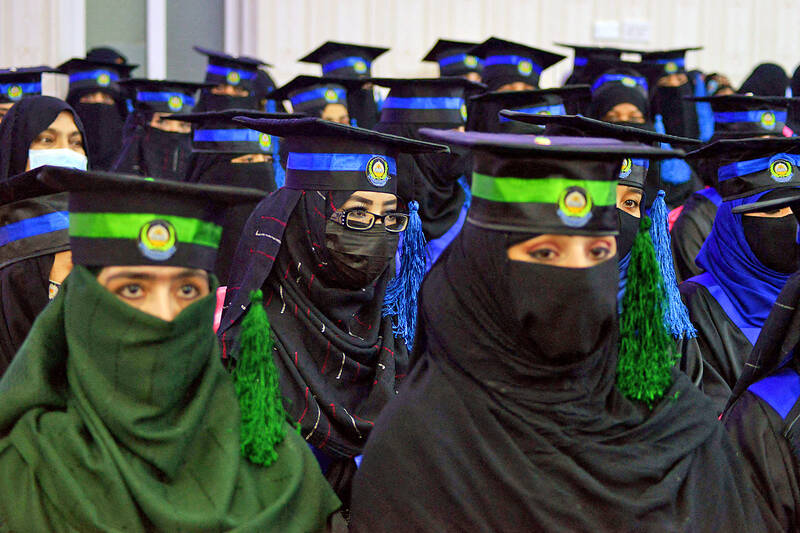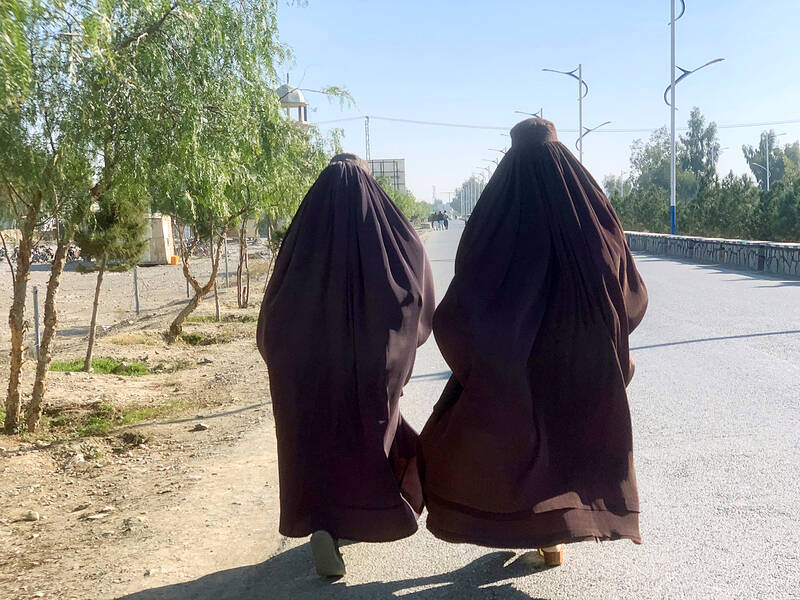Hidden in the basement of a private home in the Afghan capital Kabul, gym instructor Laila Ahmad takes a group of women through a clandestine exercise class — the windows are blacked out, there is no pumping music and visitors arrive by a back door.
The Taliban banned women from gyms and parks last month, the latest clampdown in a progressive erosion of their freedoms that drew swift international condemnation.
But Ahmad, a 41-year-old divorcee with qualifications in bodybuilding and yoga, remains defiant.

Photo: AFP
“Women can’t go to restaurants and cultural events by themselves any more, or even walk alone in the park, so these underground gyms are like a beacon of hope for us,” she said.
Since seizing power in August last year, the Taliban have shut girls’ high schools, barred women from most jobs and imposed harsh constraints on their dress and movement.
The UN says the Islamist group’s treatment of women could amount to a crime against humanity. The Taliban reject the allegation, and say they respect women’s rights in accordance with their interpretation of Islamic law.

Photo: EPA-EFE
But across the country, some women are circumventing the rules to open underground businesses — from schools to beauty salons and gyms.
Ahmad’s clients include former UN staff, government workers, teachers, policewomen, journalists and businesswomen.
“This is the only place they can connect with their past and feel alive,” she said.
“Coming to the gym is like therapy. Even though we can’t play music, we still dance — but now we dance in headphones.”
PUNISHMENT THREAT
Gyms with high-tech machines, plasma screens and thumping soundtracks began to become popular among educated and professional women in more progressive cities a decade ago.
Offering classes in everything from aerobics to Zumba, a Latin dance workout, they boosted women’s confidence, and provided a meeting place where they could socialize and hold parties.
In some parts of Kabul, women could even walk to the gym in leggings and a loose top. But not any more; Ahmad’s clients arrive in full hijab, their sports kit hidden in bags.
Many do not tell anyone where they are going. Some families would consider the gym a waste of money amid the country’s crippling economic crisis.
Others in the deeply patriarchal society believe women’s gyms and the body-hugging sportswear and pop music that go with them are an immoral Western import.
“We’re not only fighting the anti-women Taliban regime, but also the anti-women culture within Afghan society,” Ahmad said.
Gyms have been mostly closed to women since the Taliban takeover, but the group issued an official ban in November, warning of punishments for those who defied it. Men’s gyms are still open.
It is not clear what penalties women could face, but the Taliban have recently resumed public floggings, a feature of their previous rule from 1996 to 2001.
“We’re scared now,” said Ahmad. “I haven’t lost any of my clients — they are still determined to come. But of course we can see the fear in each other’s eyes.”
‘I FEEL ANGRY’
At an underground gym in the western city of Herat, Ramzia is pummeling a punchbag. Her fists flying, she imagines smashing the Taliban in the face.
Twice a week, she visits a private residence where women quietly lift weights and exercise on machines in a basement. The 27-year-old likes to box and cycle.
“When I cycle I feel I’m leaving behind all the disasters that happened last August,” said Ramzia, who asked to use a pseudonym.
“I do lots of boxing because I feel angry and weak. I hope one day I will be strong enough to punch them in the face for depriving us of our rights.”
Ramzia used to earn a good salary as a media trainer and was hoping to return to university to pursue a masters in civil engineering. Now largely trapped at home, she earns a small income, giving maths lessons to girls shut out of education.
Although she is frightened of going to the gym since the Taliban’s announcement, she says she would be swallowed up by depression if she stopped.
“We’re not committing any sin or crime. This is normal, and the Taliban and society should understand that,” she added.
The underground fitness centre is run by Monika Yosef, a former Islamic studies teacher. When the Taliban shut her school, Yosef gathered together some sports equipment and moved it into her home.
The 36-year-old, who opened her gym at the beginning of the year, said it was a lifeline for women who had lost their jobs and been rendered “prisoners in their own homes”.
“It helps us not only stay physically active, but we can also share our pain and anger,” she said.
“Our generation fought for equality. We will not give up and remain silent.”
Like other women who have opened underground businesses, Yosef and Ahmad have seen their earnings plummet.
Yosef, who used to make the equivalent of US$200 a month as a teacher, now earns US$60. Most of her clients are unemployed so she charges just US$2 a month.
Ahmad’s monthly income has plunged from about US$350 to US$100. Her classes have shrunk from 50 clients to 15 maximum, and no one can afford her one-on-one lessons any longer.
Her biggest fear is that the Taliban will shut the gym. As a single woman living alone, she has no other means to survive.
“I have to work in secret, or I starve to death,” she said.

Growing up in a rural, religious community in western Canada, Kyle McCarthy loved hockey, but once he came out at 19, he quit, convinced being openly gay and an active player was untenable. So the 32-year-old says he is “very surprised” by the runaway success of Heated Rivalry, a Canadian-made series about the romance between two closeted gay players in a sport that has historically made gay men feel unwelcome. Ben Baby, the 43-year-old commissioner of the Toronto Gay Hockey Association (TGHA), calls the success of the show — which has catapulted its young lead actors to stardom -- “shocking,” and says

The 2018 nine-in-one local elections were a wild ride that no one saw coming. Entering that year, the Chinese Nationalist Party (KMT) was demoralized and in disarray — and fearing an existential crisis. By the end of the year, the party was riding high and swept most of the country in a landslide, including toppling the Democratic Progressive Party (DPP) in their Kaohsiung stronghold. Could something like that happen again on the DPP side in this year’s nine-in-one elections? The short answer is not exactly; the conditions were very specific. However, it does illustrate how swiftly every assumption early in an

Inside an ordinary-looking townhouse on a narrow road in central Kaohsiung, Tsai A-li (蔡阿李) raised her three children alone for 15 years. As far as the children knew, their father was away working in the US. They were kept in the dark for as long as possible by their mother, for the truth was perhaps too sad and unjust for their young minds to bear. The family home of White Terror victim Ko Chi-hua (柯旗化) is now open to the public. Admission is free and it is just a short walk from the Kaohsiung train station. Walk two blocks south along Jhongshan

Francis William White, an Englishman who late in the 1860s served as Commissioner of the Imperial Customs Service in Tainan, published the tale of a jaunt he took one winter in 1868: A visit to the interior of south Formosa (1870). White’s journey took him into the mountains, where he mused on the difficult terrain and the ease with which his little group could be ambushed in the crags and dense vegetation. At one point he stays at the house of a local near a stream on the border of indigenous territory: “Their matchlocks, which were kept in excellent order,